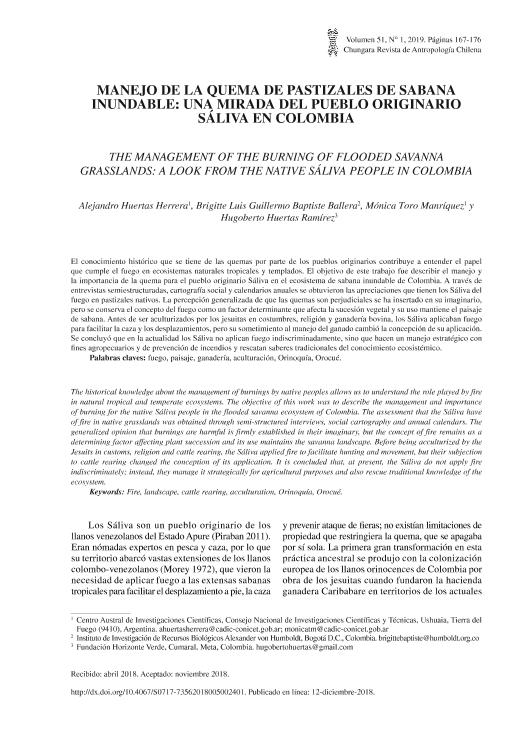Mostrar el registro sencillo del ítem
dc.contributor.author
Huertas Herrera, Alejandro

dc.contributor.author
Briggite Baptiste
dc.contributor.author
Toro Manríquez, Mónica del Rosario

dc.contributor.author
Hugoberto Huertas Ramírez
dc.date.available
2020-11-02T20:23:16Z
dc.date.issued
2019-03
dc.identifier.citation
Huertas Herrera, Alejandro; Briggite Baptiste; Toro Manríquez, Mónica del Rosario; Hugoberto Huertas Ramírez; Manejo de la quema de pastizales de sabana inundable: una mirada del pueblo originario Saliva en Colombia; Universidad de Tarapacá. Facultad de Ciencias Sociales y Jurídicas. Departamento de Antropología; Chungara ; 51; 1; 3-2019; 167-176
dc.identifier.issn
0717-7356
dc.identifier.uri
http://hdl.handle.net/11336/117438
dc.description.abstract
El conocimiento histórico que se tiene de las quemas por parte de los pueblos originarios contribuye a entender el papel que cumple el fuego en ecosistemas naturales tropicales y templados. El objetivo de este trabajo fue describir el manejo y la importancia de la quema para el pueblo originario Sáliva en el ecosistema de sabana inundable de Colombia. A través de entrevistas semiestructuradas, cartografía social y calendarios anuales se obtuvieron las apreciaciones que tienen los Sáliva del fuego en pastizales nativos. La percepción generalizada de que las quemas son perjudiciales se ha insertado en su imaginario, pero se conserva el concepto del fuego como un factor determinante que afecta la sucesión vegetal y su uso mantiene el paisaje de sabana. Antes de ser aculturizados por los jesuitas en costumbres, religión y ganadería bovina, los Sáliva aplicaban fuego para facilitar la caza y los desplazamientos, pero su sometimiento al manejo del ganado cambió la concepción de su aplicación. Se concluyó que en la actualidad los Sáliva no aplican fuego indiscriminadamente, sino que hacen un manejo estratégico con fines agropecuarios y de prevención de incendios y rescatan saberes tradicionales del conocimiento ecosistémico.
dc.description.abstract
The historical knowledge about the management of burnings by native peoples allows us to understand the role played by fire in natural tropical and temperate ecosystems. The objective of this work was to describe the management and importance of burning for the native Sáliva people in the flooded savanna ecosystem of Colombia. The assessment that the Sáliva have of fire in native grasslands was obtained through semi-structured interviews, social cartography and annual calendars. The generalized opinion that burnings are harmful is firmly established in their imaginary, but the concept of fire remains as a determining factor affecting plant succession and its use maintains the savanna landscape. Before being acculturized by the Jesuits in customs, religion and cattle rearing, the Sáliva applied fire to facilitate hunting and movement, but their subjection to cattle rearing changed the conception of its application. It is concluded that, at present, the Sáliva do not apply fire indiscriminately; instead, they manage it strategically for agricultural purposes and also rescue traditional knowledge of the ecosystem.
dc.format
application/pdf
dc.language.iso
spa
dc.publisher
Universidad de Tarapacá. Facultad de Ciencias Sociales y Jurídicas. Departamento de Antropología
dc.rights
info:eu-repo/semantics/openAccess
dc.rights.uri
https://creativecommons.org/licenses/by-nc/2.5/ar/
dc.subject
FUEGO
dc.subject
PAISAJE
dc.subject
GANADERIA
dc.subject
ACULTURIZACION
dc.subject
ORINOQUIA
dc.subject
OROCUE
dc.subject.classification
Otras Agricultura, Silvicultura y Pesca

dc.subject.classification
Agricultura, Silvicultura y Pesca

dc.subject.classification
CIENCIAS AGRÍCOLAS

dc.title
Manejo de la quema de pastizales de sabana inundable: una mirada del pueblo originario Saliva en Colombia
dc.type
info:eu-repo/semantics/article
dc.type
info:ar-repo/semantics/artículo
dc.type
info:eu-repo/semantics/publishedVersion
dc.date.updated
2020-04-24T18:00:35Z
dc.journal.volume
51
dc.journal.number
1
dc.journal.pagination
167-176
dc.journal.pais
Chile

dc.journal.ciudad
Arica
dc.description.fil
Fil: Huertas Herrera, Alejandro. Consejo Nacional de Investigaciones Científicas y Técnicas. Centro Austral de Investigaciones Científicas; Argentina
dc.description.fil
Fil: Briggite Baptiste. Instituto de Investigación Alexander Von Humboldt; Colombia
dc.description.fil
Fil: Toro Manríquez, Mónica del Rosario. Consejo Nacional de Investigaciones Científicas y Técnicas. Centro Austral de Investigaciones Científicas; Argentina
dc.description.fil
Fil: Hugoberto Huertas Ramírez. Fundacion Horizonte Verde; Colombia
dc.journal.title
Chungara
dc.relation.alternativeid
info:eu-repo/semantics/altIdentifier/url/http://chungara.cl/Vols/2019/51-1/019-HUERTAS_HERRERA_ET_AL.pdf
dc.relation.alternativeid
info:eu-repo/semantics/altIdentifier/doi/http://dx.doi.org/10.4067/S0717-73562018005002401
Archivos asociados
